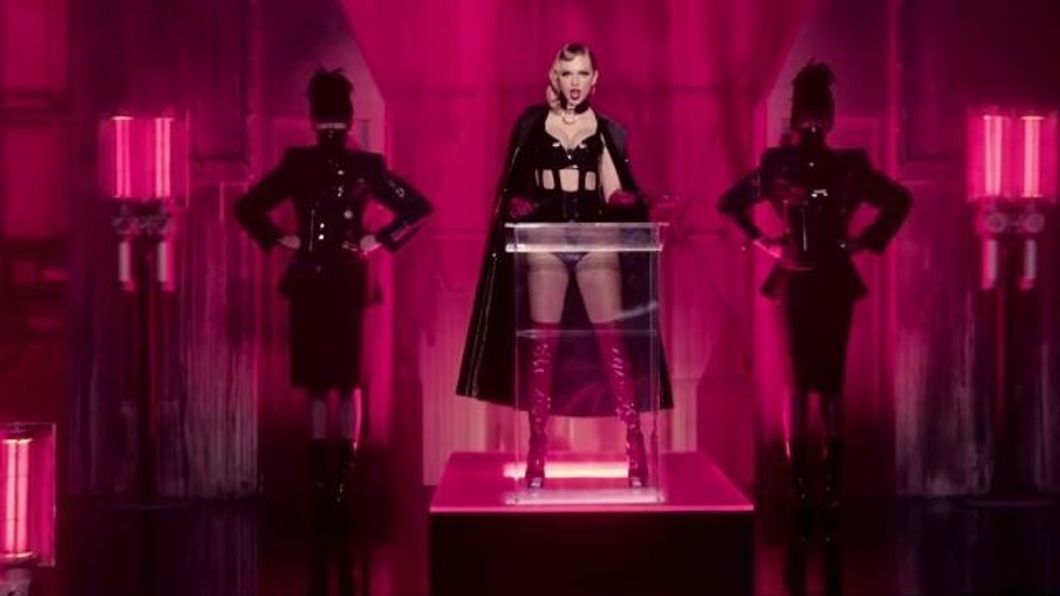Traditional media, such as music and TV, has a massively toxic impact on high school-aged teens, particularly girls. They subconsciously take in the ideas that they have to relinquish their identities to become sex objects, they should aspire to be rich and famous without doing any work to get there, and choose as many beautiful people as possible to be their friends so they can validate each other based on their looks.
First off, the Kardashian family only became famous because of Kim's leaked sex tape. Now they are known for their sex appeal and wealth that they display on their reality show, Keeping Up With the Kardashians. Since they have no discernible talent, they send the message that wealth is the only thing that matters and someone can become that way without doing any work. They aren't associated with real work because it's not glamorous. Nowadays teens deep down dream of making a lot of money without doing any of the actual work it takes to get there.
Since the focus on these celebrities is more on sex appeal than actual talent or intelligence, teens don't feel that they need to hone those skills. For example, a girl might dream of attending UCLA, a notoriously exclusive university, but get discouraged when she has a hard time in school and struggles with the material. Rather than asking for help from a teacher or improving her studying skills, she chooses to focus on something she can easily control: her looks. She asks other peoples' opinions through polls on her Instagram story on which manicure to get or which vanity is more conductive to doing her makeup instead of how to succeed in the class she's having trouble with or what older students did to get into her dream school so she has a better chance of getting in as well. Instead of trying to solve the problem, she turns to something else that's easier to control and she knows she can accomplish, rather than the harder option, which is asking for help with her studies and actively doing something about her future. She chooses to take the passive route in terms of academics and chooses instead to improve her looks, because that's easier for her.
This path is similar to how Kim Kardashian took the easy route to fame. She used her body, so now she and her family are famous without having to do any actual work. Teens today, especially easily influenced ones, might claim they want to go to elite schools or have high paying jobs when they grow up but don't have the actual motivation to do the work to get there. They subconsciously convince themselves they're not capable of doing so. They just want the end result, which is the money. They want the dream, which is to be young, beautiful, and rich.
Teen girls also use suggestive poses in pictures to objectify themselves, often accompanied by a suggestive caption. Females are more likely to self-sexualize than males because womens' bodies have been used as props both for advertisements and music videos. As a result of women being sexualized in traditional media, teenagers take their lead and sexualize themselves on social media.
Poses with hair covering the face takes away a girl's identity, and reduces her to just a body. This dehumanizes her and gives off the message that only her body matters. There's also a pose in which a girl has her palms up against a wall and faces the side. It's reminiscent of a female prisoner, and a situation in which a woman has no agency. It internalizes that she's giving up her power and relinquishing it to a man. Similar to that is a passive pose in which a girl has her finger in her mouth and sucks on it, as a baby would. This also entails the idea of a woman giving up her agency so that men will find them attractive. Posing that way infantilizes a woman and implies that she's weak and needs a man to take care of her.
This relates to the ideas discussed by Simone de Beauvoir in "The Second Sex". She says, "Indeed, along with the ethical urge of each individual to affirm his subjective existence, there is also the temptation to forgo liberty and become a thing", illuminating the path that a lot of teens fall prey to. De Beauvoir rightly points out, "This is an inauspicious road, for he who takes it – passive, lost, ruined – becomes henceforth the creature of another's will, frustrated in his transcendence and deprived of every value. But it is an easy road; on it one avoids the strain involved in undertaking an authentic existence", describing how people take this path are of the passive type and are too intimidated to go after what really matters. She then goes on to say, "Thus, woman may fail to lay claim to the status of subject because she lacks definite resources...because she is often very well pleased with her role as the Other", which matches the phenomenon of girls presenting themselves as sex objects, and feeling that what they're doing is empowering because they don't know any better.
To this age group, being seen as a party girl is desirable. Rapper Cardi B, who most teens love and reference, released a song this year called "Bartier Cardi", with the refrain "Your bitch wanna party with Cardi", and it's one of her most popular hits. On social media, teens emphasize themselves partying and showing off themselves drinking because it's easier than actually accomplishing anything. They put up the illusion that they're sophisticated, and hope that their peers will consider them more sophisticated. This is their way of showing that they're not kids anymore, tossing away their childhood and rushing into what they perceive as adulthood as fast as they can. It's also a way to mask their vulnerability. Expressing an interest for anything other than partying and the things that come with it isn't considered as cool, and this is the only subject they feel they can express appreciation for. They portray themselves as cooler than the people who don't party and are good students because deep down they're insecure and feel like they can't achieve as much as their more accomplished peers, and this is their way of making up for it.
Singer-songwriter Taylor Swift is often seen on the red carpet or hanging out at award shows with a huge group of girls that the media has dubbed her "squad".She has parodied the concept in her music video "Look What You Made Me Do", in which she commands a robot army of modelesque women in dominatrix clothing, and later sits next to a pile of them, dead, to combat the rumor that she recruits beautiful models to be her friends than gets rid of them once they disagree with her.
Nevertheless, the overall effect of the media's portrayal of "Taylor Swift's squad" is the idea that one of the ultimate accomplishments is having a huge group of friends who are all attractive and glamorous. Having a small group of friends or even one best friend, is seen as less desired. Because of this, a lot of friendships within groups are fake. When one person doesn't like another or has a problem with them, they stay silent about it because they don't want to cause problems and potentially break up the group, and by extension the illusion of a perfect "squad" of friends.
On a similar note, looks are now a more valued quality in a friend. This is especially evident when a girl posts a selfie on Instagram, and a girl in her group comments, "My BFF is hot" with many heart-eyed emojis, and another comments "I'm so lucky to have you as my best friend". There is a clear emphasis on beauty, and a teen is, on social media, more likely to be proud of, claim as hers, and brag about an attractive friend of hers rather than a smart or kind one that isn't attractive. Plus if the friend happens to be beautiful and a generous person, it's her beauty that will be complimented and gushed over.
This results in a loss of self-esteem for girls who see their friends commenting on other girls' pictures and featuring them on their Instagram stories complimenting their beauty and showing their appreciation, while they themselves get, in their view, nothing. They feel as if they're not being a good enough friend because one of their best friends goes out of their way to compliment other people and not them. They feel insecure about their looks and assume they're not pretty enough because they're not being publicly praised along with "everyone else".
Despite its effects, traditional media is not inherently bad. Teens just have to be more concious about what they're taking in. They have to remind themselves that if they want to get ahead in life, they'll have to focus on a lot more than just their looks. They must discover that a true friend doesn't value what they look like to others above everything. Most importantly, they must learn to retain their identity and be a subject, rather than an object.
















